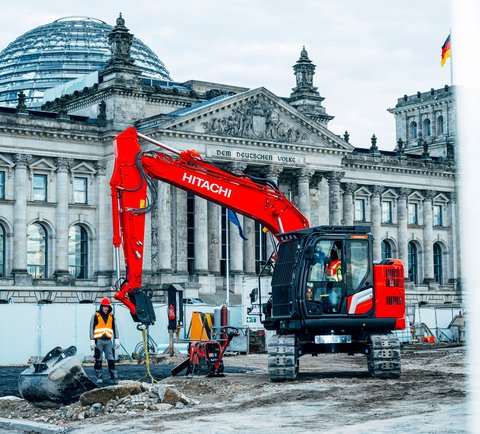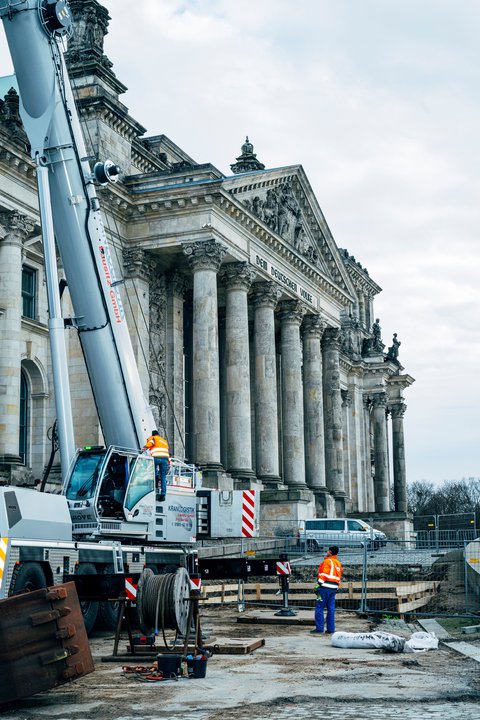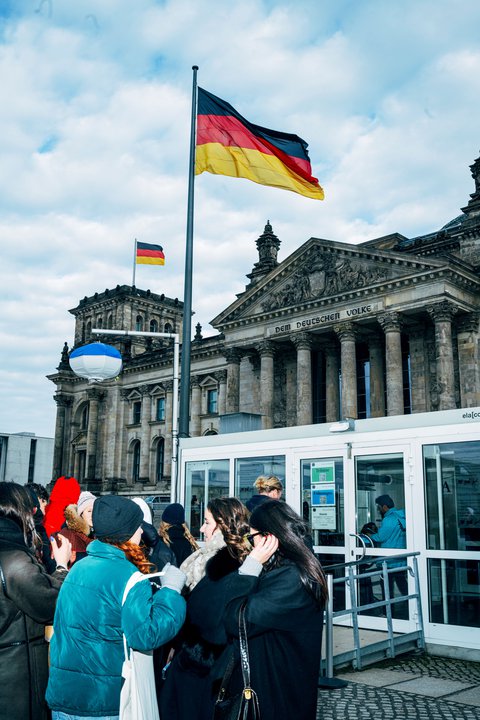Ulf Buermeyer is a lawyer and co-host of the most successful political podcast in Germany. At the end of our Democracy Music Festival on 3 October 2024 in the former government district of Bonn, he will host a »Lage Live« in the historic Bundestag plenary chamber together with journalist Philip Banse. Journalist Hannah Schmidt asked: What is the state of our democracy?
Podcaster Ulf Buermeyer in interview
On the state of the nation

In your podcast »Lage der Nation«, which you do together with Philip Banse, you have been analysing German politics on a weekly basis for several years now. How has the political situation in Germany developed since you started the podcast?
We are observing that political debates are becoming less and less focussed on the facts: Unfortunately, there is a lot of misinformation circulating, fake problems are often discussed or obviously unsuitable solutions to real problems are proposed in a populist manner. In the face of this flood of misleading information and at the same time very real problems, frustration is spreading among many people.
What role has journalism played in this development?
The starting point for the problem described above is the political parties, some of which – with considerable differences, of course – communicate in a less factual manner than they did ten years ago. At the same time, not all media outlets are sufficiently taking up the challenge of providing people in Germany with truly well-founded information in light of this. It is no longer enough to report that party A demands this and party B that. People in Germany are dependent on political positions being analysed and put into context.
What does that mean in concrete terms?
The media must scrutinise political statements for accuracy and, if necessary, directly label them as false. Friedrich Merz’s statement on the allegedly overly generous dental treatment, for example, could be refuted with a quick look at the law. Headlines should not say that Merz is criticising something, but it must be clear that he is telling an untruth.

With this in mind, what do you think about the state of democracy in Germany 2024 – and why?
We often ignore the country’s real problems. In our book »Baustellen der Nation« (»Construction sites of the nation«), we have described eight policy areas where a lot has been left undone in recent decades or where the course has been set completely wrong. But instead of tackling these construction sites with commitment, the public debate in our country often centres on pseudo-problems such as migration or gendered language issues. This doesn’t get us anywhere, it creates a reform backlog – and that makes some people doubt the effectiveness of democracy as a whole.
The »construction sites« you describe include the state of the railway, unequal starting opportunities for children and cumbersome federalism. Which of these eight issues is the most urgent?
All construction sites must be tackled now because they are essential for the future of our country, and at the same time many are interrelated, such as education and digitalisation. But there is one construction site that is actually creating problems in all policy areas, namely our federalism, which is currently all too dysfunctional. So if I could choose one solution that the parties should tackle as quickly as possible, it would be to abolish the current blocking power of the Bundesrat (Federal Council).
Is the current government doing enough and the right thing to tackle the construction sites?
The federal government is setting the right course in some areas, for example to get the railways back on track or to produce more renewable energy. However, very little has been done so far on most construction sites, and the current coalition alone can only achieve very little in view of the opposition’s co-government via the Bundesrat.
What needs to happen politically?
This cannot be summarised in one sentence – it is in our book. What can be said about most of the construction sites, however, is that the federal, state and local governments need to raise much more money in order to clear the gigantic investment and refurbishment backlog that has arisen in 20 years of longing for the »black zero« – conservative estimates put the infrastructure debt at 600 billion euros.

What happens if nothing changes?
If the debt brake is not reformed to enable these investments, the only option will be massive tax increases, because there is no alternative to spending as such. The coalition has already recognised this for the federal army and the railways, but the plight also affects many other areas, such as education, public transport, the healthcare system and digital infrastructure.
We are now dealing with an increasingly strong right-wing populism in the public debate and in parliament. In your view, what can politicians, what can the population do about it now?
The democratic parties in Germany should launch a joint initiative to break the blocking power of the Bundesrat. The majority in the Bundestag must once again be able to shape policy without the federal states being able to sabotage it on all key issues. This is ultimately a requirement of the principle of democracy: whoever wins a majority in the Bundestag elections must also be able to implement their ideas.
As a next step, the parties should consider what people’s real concerns are – not migration or gender, but public transport, schools, infrastructure, etc. – and address these issues with commitment.
Live podcast at the festival 2024
- , Bundestag Plenary Hall
Live Podcast: »Lage der Nation«
Ulf Buermeyer, Philip Banse
